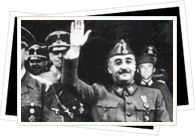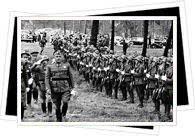 Francisco Franco began his campaign for power and, in 1936, sparked the on-set of the Spanish Civil War. The war, one of the bloodiest and most violent wars in recent history, was also the world's first "modern" war- and in many ways a precursor to World War II. The first bombing raids in Spanish and world history were conducted by Franco's German allies upon the unsuspecting Basque towns of Guernica and Durango and for the first time radio was used as a major propaganda tool.
Francisco Franco began his campaign for power and, in 1936, sparked the on-set of the Spanish Civil War. The war, one of the bloodiest and most violent wars in recent history, was also the world's first "modern" war- and in many ways a precursor to World War II. The first bombing raids in Spanish and world history were conducted by Franco's German allies upon the unsuspecting Basque towns of Guernica and Durango and for the first time radio was used as a major propaganda tool.
 Eventually Spain's Second Republic was no longer able to compete with Franco, who was backed both by Fascist Italy and Nazi Germany. Franco's forces won the war in 1939: the first year of Franco's subsequent 35-year dictatorship. The first few years Franco instituted rigid censorship, concentration camps, widespread imprisonment and even executions. Only one political party was allowed in Franco's Spain: the Falange. Under Franco, Spain became completely isolated from the international scene, both politically and economically.
Eventually Spain's Second Republic was no longer able to compete with Franco, who was backed both by Fascist Italy and Nazi Germany. Franco's forces won the war in 1939: the first year of Franco's subsequent 35-year dictatorship. The first few years Franco instituted rigid censorship, concentration camps, widespread imprisonment and even executions. Only one political party was allowed in Franco's Spain: the Falange. Under Franco, Spain became completely isolated from the international scene, both politically and economically.
Huge loans offered by the United States government in exchange for the establishment of an American nuclear base on Spanish soil helped to kick-start the economy, leading to rapid economic and industrial growth. However, this eventually only brought to light the corruption of Franco's regime. Unable to deal with popular demands such as higher incomes and better educations, and wanting to give the impression of strength, the Franco pushed Spain back into the excessive repression of the post-Spanish Civil War years. Unhappy workers on strike were hauled out of factories and mines, imprisoned and, in some cases, even executed. Many Basques, long a fervently independent region of Spain, were declared terrorists and tortured.
After 35 long years in absolute power, Franco died in 1975. He named Juan Carlos - Spain's current king - as his successor, believing that he had groomed the young future monarch to continue his personal "misison." However, seeing the need for change, King Juan Carlos cautiously set about reverting Spain to a democratic state.
Just three years later - in 1978 - a new constitution made Spanish history and turned the country into a full-fledged democracy. Spain's first president, the widely popular Felipe González of the PSOE party, was elected. In 1986, Spain's acceptance into the newly formed European Union signalled an end to Spain's political, economic and social isolation and an important beginning to international participation.
Learn more about today's Spanish government...